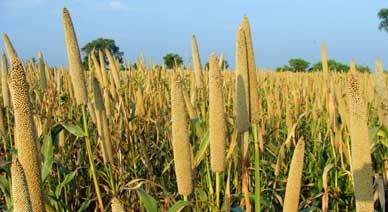Can seed innovation save the marginal Indian farmer?
Farmers, civil society, researchers and government officials draft directive principles for sustainable seed innovation at Round Table
Bengaluru, 15 September 2017: The Art of Living collaborated with Max Planck Institute of Innovation and Competition and Leeds University for a research project on ways to promote sustainable innovation on indigenous seeds among Indian farmers. This was mission critical and path breaking for one very important reason. 90% of the farmers in India are marginal who own less than 2 hectares of land. They end up in a vicious cycle of debt, having to purchase expensive seeds and fertilizers from an external source.
Delivering the keynote address at The Sustainable Seed Innovation Round Table facilitated by The Art of Living at its headquarters on Friday, its founder Gurudev Sri Sri Ravi Shankar said, “Preservation of diversity in seeds is essential. The extinction of even one variety can have great repercussions in this inter-connected world.”
Padmashri Dr. Suman Sahai, Chairperson of The Gene Campaign said that innovation does not just happen in a laboratory, but also in the farm, as the farmer has an understanding of the crop that goes beyond its physical properties.
Framework developed to promote seed innovation in order to fight climate change, water crisis
It was contended that research on agricultural techniques has primarily been conducted on large landholdings in water rich regions. This has failed to produce the same results on marginal landholdings in rain-fed regions. Natural farming techniques that use less water, enrich the soil with nutrients, cost less than chemical farming and are based on preservation of the indigenous seed benefit marginal farmers. This was further corroborated by a 11-month research project by The Art of Living, Max Planck and Leeds University.
“Given the huge agri-biodiversity of India, if the marginal farmer can be promoted to the status of an innovator, then India can export seeds as a technology to the whole world,” remarked Mrinalini Kochupillai, Senior Research Fellow from the Max Planck Institute of Innovation and Competition, at the Round Table.
Mr. Sanjay Khattal, Director of National Seeds Corporation who participated in the Round Table said that the Government will explore possibilities to support the promotion of indigenous seed innovation.
Dr. Natalie Kopytko and Dr. Gregory Radick from Leeds University, Dr. Prabhakar Rao, Trustee of Sri Sri Institute of Agricultural Sciences and Technology, Sanjay Maruti Patil, from BAIF Institute for Sustainable Livelihood and Development and Kishore Kumar Sharma, Professor at Assam Agricultural University amongst others participated in the Round Table.
Yash Mishra, a farmer from Chattisgarh speaking about the importance of seed conservation said that native seeds have more nutrition, taste and variety and can withstand erratic climate and this will help poor and marginal farmers as was his experience. Other farmers echoed his sentiment.
The Art of Living has been working to create an ecosystem of healthy and sustainable farming for the last 37 years and has trained 22,00,000 farmers across the country in natural farming techniques. Seed banks have been set up to preserve indigenous varieties of seeds and the organization is now taking the next step of promoting sustainable innovation on these seeds.

